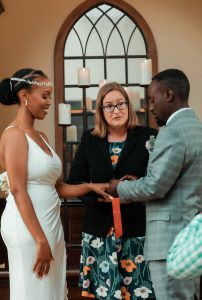What to discuss with your wedding officiant?
May 12, 2023
You know you need a credentialled wedding officiant to make your ceremony legal. But what kinds of things should you talk to your officiant about before the wedding?
 Their credentials: You can inquire how they are credentialled and ask to see proof. In the province of Ontario there is a government list where you can search for anyone registered to conduct marriage ceremonies. https://data.ontario.ca/dataset/registered-marriage-officiants
Their credentials: You can inquire how they are credentialled and ask to see proof. In the province of Ontario there is a government list where you can search for anyone registered to conduct marriage ceremonies. https://data.ontario.ca/dataset/registered-marriage-officiants
The legal bits: When are you planning on getting your marriage licence? (In QC it’s the officiant who acts as the licensing agent). Your officiant will appreciate it if you can send them a clear photo or scan of the licence in advance so they can prep some of their paperwork.
The ceremony language/script: The legal requirements for a wedding ceremony are simple and minimal (question of intent for each partner, sign the paperwork, pronounce you as married, and in Quebec the Civil Code must be read). The rest is up to you. Bring your officiant your favourite poems or readings to include in the script. (They may have suggestions as well if you don’t know where to start.) Talk about any anecdotes or shared experiences or hobbies that you’d like to be mentioned in the ceremony. Discuss ways to honour loved ones who have passed. Talk about cultural traditions you’d like to include.
Tone: Lighthearted and relaxed? Formal and distinguished? Let your officiant know what tone you are hoping to strike, and they will do their best to accommodate.
Colour and theme: Officiants are often happy to dress to complement a couple’s chosen colours or theme. Is it a Western and denim theme? Black tie with a touch of purple? Hawaiian shirts? Feel free to talk about how the officiant should dress.
Mechanics and logistics of the day: Tell your officiant who is responsible for music and/or microphones. How many are in the wedding party? Who will have the rings? Who are the witnesses?
Rehearsal (if you are planning one): Do you need your officiant there? Do you need them to run the rehearsal? What dates/times are you considering?
Additional questions: Don’t be afraid to ask for advice. Your officiant probably has a great deal of experience and may be able to suggest ways to handle potentially difficult situations. For example, divorced parents who don’t get along, blended families, multifaith unions, an uncle with a drinking problem who may make a fuss, etc. You can also talk to your officiant about your feelings or fears. If they know you are anxious about speaking in front of a crowd, they can help.
Your wedding officiant will try to make your day everything you want it to be. They are more than just the person who “signs the papers,” they are a great asset to your wedding planning, your personal cheerleader, and an understanding ear.